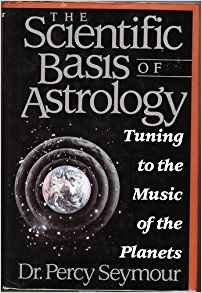Dr. Percy Seymour, an unusual scientist with an open mind, has considered the evidence and concluded that our geomagnetic field, as well as that of the Sun and even planets, may account for the influence we call astrology. In his book, The Scientific Basis of Astrology: Tuning to the Music of the Planets, Seymour traces the history of our involvement with natural cycles over millennia and puts our relationship with the cosmos in an evolutionary context. This book was released in 1992, when the Uranus-Neptune conjunction in Capricorn was first near exact, and it reflects a more cosmic view of history and cycles. To me, this time was a turning point for thinkers considering astrology from different points of view. 
Living organisms are locked into the fluctuations of our geomagnetic system and all life on earth has evolved within it. Seymour first surveys the development of calendars and clocks over the centuries, and we see how intimately we’ve been part of the cycles around us. We then look at numerous studies of the seasonal behavior of mammals, birds and insects, and how exposure to light can influence them.
The Moon’s connection with the tides is well known, but it also has a proven link to rainfall. It’s fascinating to learn about studies done on how bacteria, bees, migrating birds, homing pigeons and even whales are directly influenced by the magnetic field that surrounds all of us. Most people are familiar with the effect that solar activity can have on electrical instruments, but studies point to the fact that solar activity may correlate with planetary movements as well.
Dr. Seymour also cites theories on geomagnetic and planetary influences and includes a discussion of the work of Michel Gauquelin, the intrepid astrological researcher. Gauquelin couldn’t prove the influence of Sun signs, and Seymour doesn’t accept them, either. (However more recent research has shown that the month of birth correlates with a risk for particular diseases.) The author also critiques his scientific colleagues for their closed minds when it comes to investigating astrology.
This is a wonderful book for any astrologer who wants to know more about how astrology might work. Each of the chapters builds on the material in the one before it, ultimately amounting to an astounding revelation. There is no index, but the Table of Contents is clear, as is the organization of the book itself.
Buy at Amazon.com: The Scientific Basis of Astrology: Tuning to the Music of the Planets
